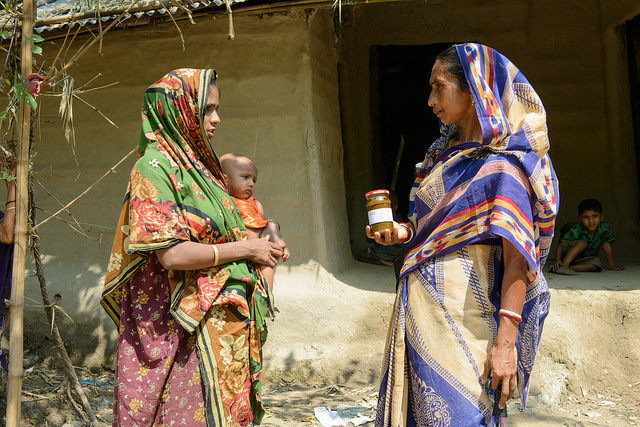‘Hidden hunger’, or micronutrient deficiency, is widespread throughout Bangladesh, where more than 20 million people, particularly women and children, suffer from chronic deficiencies of vitamin A, iron, and zinc. Micronutrient deficiencies cause irreversible damage in young children, stunting their growth and inhibiting their brain development and cognition, making it difficult for them to learn at school and perform at work later in life.
Despite efforts to improve dietary diversity in Bangladesh many women and children consume inadequately diverse diets. Strategies to improve nutrition have often focused on bio-fortified and fortified foods and supplements. However these approaches have seen mixed results due to issues around cost, access and acceptability. There are also questions around sustainability and bioavailability.
WorldFish, working together with the University of Queensland and private sector partners, in Bangladesh, have developed a chutney and a flour made from small fish and other locally sourced ingredients. A recent study shows that the products could have significant benefits for child and maternal health in areas where undernutrition is prevalent.
Small indigenous species of fish offer a unique opportunity to contribute to optimal nutrition during the first 1000 days of life due to their content of both essential fatty acids and micronutrients such as calcium, iron, zinc, vitamin A and vitamin B12 which are often considered ‘problem nutrients’, particularly in low-income countries.
The chutney made from dried small fish, oil, onion and spices can be served as an accompaniment to daily meals for pregnant and lactating women, and a flour of dried small fish, orange sweet potato, rice and oil can be boiled with water and served as a porridge for infants and young children.

Field staff handing over a jar of fish chutney in Sunamgunj, Bangladesh. Photo by Finn Thilsted
There is consensus that the first 1000 days of a child’s life, from conception through the age of two years, including the transition from exclusive breast feeding at six months provide a ‘critical window of opportunity’ to promote optimal growth and development of infants. For a country like Bangladesh, where a significant portion of the world’s undernourished and where 24% of women (aged 15-49) have a body mass index (BMI) below the healthy range, a food-based strategy which increases dietary diversity at low cost is compelling.
Homegrown products have powerful advantages over commonly used food fortification and supplement methods in improving nutrition. In Bangladesh, as in many resource-poor areas of the world, there is a strong case for inexpensive, locally-sourced solutions as a means to reduce food and nutrition insecurity. Using small fish in nutritious, locally-produced foods is a sustainable means of promoting good nutrition and health that will also provide a source of income for both producers and processors.
It’s clear from our studies that the inclusion of small indigenous fish, an underutilized animal-source food, in combination with other local nutrient-rich ingredients in food products warrants further investigation.
The aim is to scale-up at the regional and global level. The basic principle can be applied in most parts of the world. If chutney is not on the standard menu of a country or region, then the recipe can be easily adapted to suit local tastes. Wherever there are small fish, there is a powerful solution to undernutrition and so we will continue to work with partners to find localized solutions to tackle this persistent and troubling global problem.
Dr. Thilstead will take part in a a session at the Borlaug Dialogue held in Des Moines, Iowa this week entitled “Sustainable Fisheries and Agriculture for Improved Food Security and Nutrition”. Follow #FoodPrize15 for the latest coverage of the event.



